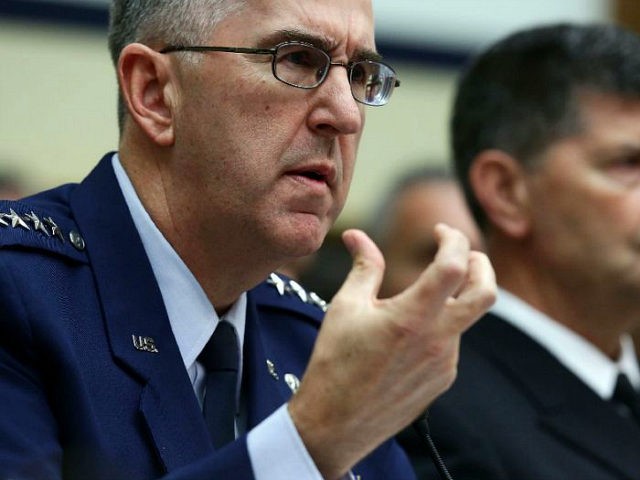WASHINGTON, D.C. — The United States is facing “significant challenges” sustaining its defense capabilities, both in the nuclear and conventional realm, and is at risk of no longer holding a military advantage over its enemies, warned the head of the U.S. Strategic Command (STRATCOM) Tuesday.
“One of our biggest challenges in the future will be staying ahead of the pace of change we see in our adversaries. We have a problem delivering timely responses to new threats. We don’t move fast enough from concept to capability,” Gen. John Hyten, the STRATCOM commander, told the Senate Armed Services Committee on Thursday.
“For decades now, we have held a military advantage over our adversaries, both from a nuclear and conventional standpoint,” he added. “That is starting to change. As our nation rightly focused on combating violent extremist organizations and the states that support them, other adversaries have taken the opportunity to develop advanced nuclear and conventional weaponry that rival many of our systems.”
America’s failure to modernize and recapitalize, its air-, land-, and sea-based defense capabilities have rendered the country vulnerable to an attack by a superpower such as Russia and China, argued the commander.
Currently, in addition to America’s nuclear deterrent capacity, some of America’s intercontinental ballistic missile (ICBM) weapons system and aircraft bombers are “operating beyond their designed service life,” he conceded
Gen. Hyten testified:
The U.S. faces significant challenges to sustain the capabilities that will meet our enduring national security objectives. At a time when Russia and other countries continue to modernize and upgrade nuclear capabilities, nearly all elements of the U.S. nuclear weapon stockpile, delivery systems, and other infrastructure are operating beyond their designed service life. Maintaining strategic deterrence, assurance, and escalation control capabilities requires a continuing, multi-faceted, long-term investment approach.
America must ensure that ongoing efforts to sustain and modernize its defense capabilities remain on track to ensure its aircraft bombers can operate efficiently and provide a credible deterrence.
Currently, “Our bombers and their associated weapons are well beyond their intended service lives, requiring attention to maintain combat readiness,” Hyten acknowledged.
Referring to the only land-based ICBM weapon system still deployed by the United States, dubbed the Minuteman, the STRATCOM commander warned that it is also operating beyond its intended lifespan.
“Launch Facilities and Launch Control Centers require investment in repair and modernization. Additionally, vehicles and equipment used to support the Minuteman weapon system require an immediate, long-term investment,” he said.
The United States can no longer afford to defer investment and commitment to the nation’s strategic abilities.
“Today’s deterrence forces remain safe, secure, reliable, and ready,” acknowledged the commander. “Nevertheless, the U.S. faces significant challenges in sustaining the required capabilities to continue to provide strategic deterrence on behalf of our nation. Our Nation’s strategic capabilities must be a core focus of our national security spending.”
“The investment in, and commitment to, our Nation’s strategic capabilities must continue, and planned sustainment and modernization activities must be completed on schedule,” he later added.” Any recapitalization program delay will adversely impact the execution of our strategic deterrence mission and degrade our ability — and ultimately our credibility — to deter and assure.”
STRATCOM is responsible for America’s operations in space, information warfare, missile defense, global command and control, intelligence, surveillance and reconnaissance, combating weapons of mass destruction (WMDs), and strategic nuclear deterrence, which includes weapons, infrastructure, and personnel.
Gen. Hyten did note that STRATCOM “is a global warfighting command.”
Despite all the challenges the U.S. military faces, he said, “All our forces, in all domains, stand ready today.”
“Our nuclear forces are safe, secure, reliable, and ready — capable of responding wherever necessary and whenever our nation calls,” he added. “These forces compel all potential adversaries to realize that any benefits they see in an attack on our nation, or our allies, will be far outweighed by the cost.”

COMMENTS
Please let us know if you're having issues with commenting.